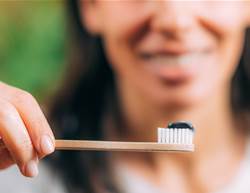Who hasn’t dashed into the supermarket and been stymied by the overwhelming number of toothpaste options: mint, fruity, gel, whitening, sensitive and, increasingly, fluoride-free? Even major companies like Colgate have followed the trend overseas, joining no-fluoride mainstays like Dr Bronner’s and Grants of Australia. No wonder global sales of toothpaste sans fluoride, are over US$6 billion and projected to soar above US$10 billion within a decade. But is fluoride bad for you?
There’s a reason it’s in so many products, after all. We looked into years of research to find out.
What is fluoride?
It’s a mineral that appears naturally in rocks, soil and water. Fluoride was added to toothpaste, as well as many community water systems after scientists realised that people whose drinking water was naturally higher in fluoride had much less tooth decay.
"Melbourne has fluoridated water since 1977; other parts of Australia have done so for more than 50 years," says Professor Oliver Jones, professor of chemistry and deputy director of RMIT Water.
Lately there has been growing criticism of fluoride, with people communities wanting it removed from their drinking water or filtering it out. And now the debate has reached the toothpaste aisle.
Fluoride benefits
To some extent, say many dentists, fluoride is a victim of its own success. It’s a key reason so many of us sport healthy smiles. We’re so unused to major tooth decay that we’ve forgotten how we got here.
“Water fluoridation is widely considered one of the greatest public health achievements of the 20th century. It is a socially equitable approach to preventing tooth decay and associated suffering, particularly in children," says Professor Jones.
Cavities are destructive holes in teeth that form when the bacteria that consume sugars in our mouths (from sweets and other carbs) produce acids. These acids can dissolve the protective enamel on a tooth’s surface, forming a cavity.
Fluoride strengthens resistance to acid and can replenish some of the enamel the bacteria destroy, says dental researcher and expert Mark Wolff. In children, fluoridated water strengthens permanent teeth as they start to come in. “We take for granted that we don’t have as much tooth decay,” says Wolff, who has consulted for toothpaste brands, but “it will return if we stop using fluoride.” Even just 50 years ago, he says, “the number of people with decay was massive.”
Nearly 100 toothpaste studies back up the claim that children, teens and adults who regularly brush with fluoridated toothpaste have much less decay, researchers with the highly regarded Cochrane Library have determined.
Another sign of fluoride’s potency: when parts of Canada stopped putting the mineral in their water, more kids in these zones needed dental work, with children five and under most at risk, researchers reported earlier this year. “The fluoride research is very clear: fluoride helps remineralise early and even later-stage cavities,” stopping them from forming or getting worse, says dentist and dental researcher Gretchen Gibson.
Even though your local water system likely adds fluoride (90% of Australians can access fluoridated water), having fluoride in toothpaste is important because its protection is applied directly to teeth. “Not having fluoride in toothpaste increases the risk that more of your teeth will decay and need treatment,” says dental expert Howard Pollick.
For people at high risk for cavities, including those with a history of decay and kids who don’t always brush well, a dentist can also apply fluoride directly to teeth. A different Cochrane Library review found fewer cavities in kids who used fluoride toothpaste and whose dentists applied a fluoride gel, varnish, or mouth rinse during cleaning appointments.
Fluoride downsides
The research seems pretty reassuring, right? Well, that’s where things get a bit tricky. Despite fluoride’s well-researched benefits, there is controversy over whether it is in fact safe to consume. Over the years, water fluoridation has been called everything from “forced medication” to “a violation of individual rights”. That said, research does show that extremely high levels of fluoride can be dangerous.
Most of the proven problems are from overconsumption, with very high doses being shown to cause mottled teeth, bone damage and joint problems, among other issues. This research has involved areas around the world with naturally extreme levels of fluoride in their groundwater, not communities where small, controlled amounts of fluoride are added. Still, the findings have caused some to sour on fluoride.
One concern researchers are still working through has to do with the idea that fluoride could be dangerous to the brain and nervous system, especially in young children, perhaps by causing inflammation and changes to brain cells. This potentially very scary issue, known as neurotoxicity, got a lot of attention when Canadian researchers found an association with slightly lower IQ levels in the preschool sons (but, oddly, not daughters) of women who’d had higher fluoride exposure while pregnant. Other researchers linked lower IQ in children in India with naturally high fluoride in their water.
But there are limits to this research: both of these studies were what is known as observational, meaning they didn’t prove that one factor caused the other. Another issue was that this research involved fluoride in drinking water, not in toothpaste, which people are not meant to swallow. Even if someone did eat a little, as children commonly do, the amount ingested would be minuscule in comparison to the levels people in these studies took in.
NSW Health reports that the evidence strongly supports that fluoridated drinking water is safe.
"Fluoridated drinking water is safe for children and adults of all ages. In 2017, Australia's National Health and Medical Research Council (NHMRC) reviewed all the scientific research into fluoridated drinking water. It found that drinking fluoridated water does not cause any health problems and has the benefit of preventing tooth decay."
The bottom line
So is fluoride toothpaste safe? A review from German researchers also concluded that evidence “does not support” calling fluoride a neurotoxin.
“In the amount people are consuming through toothpaste after spitting, I do not worry about it creating problems,” says Wolff. In fact, fluoride amounts are regulated by the Therapeutic Goods Administration; companies can’t simply load up their pastes with astronomical levels of it. If people take proper care of their teeth, many can remain cavity-free, he adds, and fluoride toothpaste is the way to do it. “This is true for children, adults and seniors alike,” Pollick says.
Prof Jones agrees: "The amount of fluoride in water is not high enough to cause an issue, even considering other sources of fluoride such as toothpaste and even black tea. There is no evidence linking fluoride in regular drinking water to conditions such as osteoporosis, bone fractures or cancer," he says.
Fluoride alternatives
If you go fluoride-free, you’ll need to severely limit sugary snacks and beverages to keep bacteria and their acids away from your teeth, Pollick says.
If you’re unsure, you could use a paste with the fluoride alternative hydroxyapatite. Small studies have shown that this ingredient also prevents cavities, but there’s less research proving its safety than there is for fluoride.









